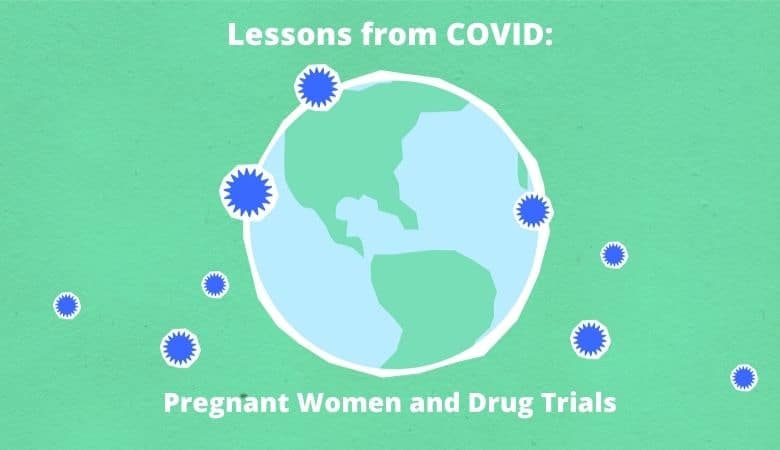Third of four in a series
Anniversaries (of birth, marriage, death, countries’ independence, war, peace) are an opportunity to celebrate, mourn, reflect back, project forward. The US and the world are marking one year of COVID, worthy of a moment’s reflection. Some countries have vanquished COVID, most have not. Our collective response to the pandemic has brought forward vulnerabilities that will outlast the pandemic, unless we use this as opportunity for long-term change. This essay on pregnant women and drug trials is the third in a series of four blogs, exploring a few such opportunities in our small corner of a world we all work so hard to improve.
Pregnant women and COVID-19
Research indicates that, while pregnant women are not more likely to get COVID-19, it is more likely to be more serious. Many pregnant women are working in essential services where they are exposed to the virus—health care providers, health care workers, teachers, grocery store and pharmacy employees.
Enter the COVID-19 vaccine:
- What are its risks and benefits?
- How much protection does it offer?
- For how long?
- What are potential side effects?
- How are these different for pregnant and breastfeeding women, their fetuses and their babies?
We have some answers for the first four questions, none for the last one.
The tragedies of thalidomide and DES showed the potential of serious harm from medications in pregnancy. Since then, from an abundance of caution, drug and vaccine trials have excluded pregnant and breastfeeding women. Though the COVID vaccine is not the first time questions have been raised about this policy, it is likely the most public and widespread one.
Medications, drug trials, and pregnancy
Clinical trials for medications and vaccines are, by their nature, risky. Research begins in petri dishes and test tubes, then on animals. However, in order to learn about their benefits, potential harm, side effects, proper dosing, and best method of ingestion, it is essential to test on human beings. To have the fullest understanding of the drug or vaccine, it is necessary to test on a large number and wide variety of people—different ages, genders, sizes, races, health statuses. Testing involves four phases, with increasing numbers of subjects, measuring safety, effectiveness, dosage, and long-term effects.
“Pregnant women get sick, and sick women get pregnant,” writes bioethicist Francoise Baylis, who, with others, has been challenging the justice and safety of the policy that excludes pregnant and breastfeeding women from drug and vaccine trials. The message that it is “better to be safe than sorry” has translated to “avoid all medicines, prescription and over-the-counter.” This approach is not safer for pregnant and breastfeeding women who have conditions that require medications to treat or manage. It can, in fact, be harmful for both mothers and their fetuses and children. Pregnant women and new mothers often stop taking necessary medications, frequently without their providers’ knowledge. As well, providers do not have information necessary to advise their patients on effects, proper dosage, or alternatives for medications during pregnancy and breastfeeding.
The Infant Risk Center is an excellent resource for expectant and new parents and for practitioners, with information on the data that are and are not available about many over-the-counter and prescription medications and vaccines.
COVID-19 vaccine in pregnancy and lactation
The COVID-19 vaccine is a powerful example that impacts hundreds of thousands of women worldwide. For example, it is known, if not well understood, that pregnancy brings with it changes in the immune system that “may alter susceptibility to and severity of infectious diseases in pregnant women.” How does this impact the effectiveness, dose, and possible risks of the COVID vaccine? Preliminary research gives us some information, but the only way to measure these effects is through clinical trials that include careful tracking and observation.
Including pregnant and nursing women in drug and vaccine trials requires guidance, thought, and planning among medication developers, clinicians, researchers, government agencies, and ethicists. Not including them in the trials is not a safe or just option. In her introduction to Academy of Breastfeeding Medicine’s Statement on Consideration for COVID-19 Vaccination in Lactation, Dr. Alison Stuebe says, “It is time to protect pregnant and breastfeeding individuals through research, not from research.”
As we are preparing to post this blog, Pfizer has announced that they are beginning a study of the effects of the COVID -19 vaccine on pregnant women and their babies. The study will involve 4,000 women; some will be given the vaccine, others a placebo. They will follow the women for 7-10 months to learn more about its effect on mothers and their babies’ health and immunity to COVID. This is an important step in ensuring vaccine safety for all.
Read the first blog of this series, on preterm birth; the second, on parents as essential caregivers; and the fourth, on breastfeeding.









